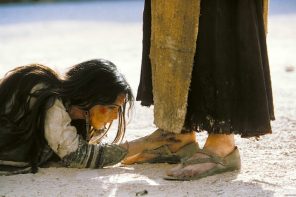Last week I traveled to Mobile Alabama, the heart of the Bible Belt, to a leafy, green college town replete with billboards for megachurches and imminent apocalypse (according to Christian broadcaster Family Radio Worldwide, May 21 is the new time and date). I had been invited by the Secular Students Alliance and the Gender Studies Department of the University of South Alabama to talk about my new book.
During my lecture I faced a standing room crowd of heretics, fence sitters, curiosity seekers, and true believers bracing for a circus sideshow. Traveling across America to speak on freethought and abolitionism during the 19th century, white feminist atheist Ernestine Rose was smeared as being a “thousand times below a prostitute.”
Centuries after Rose, the association of faith with female virtue and morality is still pervasive in our post-feminist post-racial Christian nation. Indeed, for some women of color, being “married to Jesus” is the only lifeline to genuine personal and spiritual validation. As Anthea Butler has noted, “having a husband meant that they could not give their ultimate all for the number one man on most African-American womens’ lips, and it’s not Denzel.”
Women as Sluts, Men as Savages
As the Religious Right continues to gut women’s rights, its cultural propaganda suggests that the only way a woman can truly be validated as a moral being is through the policing of her body and her sexuality. Tragically, some of the most vociferous defenders of this regime are other women. At the end of my lecture, one woman came up to me and angrily demanded to know where I’d found the passage from Deuteronomy (20:10) which states that believers have the right to capture and enslave other tribes and keep their women and children as spoils that “God has given you.”
When I read another passage from Deuteronomy (22:28-9) that endorses sexual terrorism and the marriage of raped women to their attackers (after a bride price is paid to the victim’s father), some audience members groaned that it was “taken out of context” and attempted to shout me down. The nuances of context are indeed important where rape is concerned. Perhaps the predator whispered sweet nothings into the victim’s ear before the assault? Or perhaps he was just overcome by his natural manly urges. Yes, the Good Book makes sluts out of women and savages out of men.
Despite the misguided belief that post-feminism rules the day, sexual terrorism against young women is still a widely accepted norm. According to a recent article on The Root, an increasing number of black girls are being sold into prostitution and sex trafficking, while “in both the international and national anti-trafficking movements, black girls who are victims of prostitution are invisible.”
In a review of the new book Girls Like Us by sex trafficking activist Rachel Lloyd, writer Rinku Sen notes,
the black and Latina girls with whom Lloyd works are thought to have chosen their life, to be oversexed or scheming or too lazy to do anything but sell themselves. They are referred to as young adults, even when they are far under 15, and cops call their rapes “theft of services.” Even though federal law says that anyone under the age of 18 who is sold for sex is a victim of severe trafficking… if the girl is an American and of color, she will too often be arrested, charged with prostitution and jailed.
Brave Young Women
The degraded morality of black and Latina girls is not an abstract concept. Attitudes about sexually impure young women come ready-made from the conservative religious traditions most of my students have absorbed, whether it’s biblical fundamentalism or Catholic dogma. In this context, any young woman who tries to educate others about feminism and anti-sexism has embarked on a brave and revolutionary journey.
As mentors for the Women’s Leadership Project (WLP), a South L.A.-based high school gender justice program, my partner Diane Arellano and I train our students to lead in-class workshops on the everyday impact of misogynistic language, stereotypes, and media imagery. Students develop critical consciousness about their shared struggle vis-à-vis the stereotype of the sacrificial good black/Latina “woman of faith.”
On several occasions our students have been chastised by girls who argued that sexual violence and high rates of HIV/AIDS contraction in communities of color was simply the fault of “slutty” girls. The good girl/bad girl mentality is everywhere. For some high school girls, compiling and circulating virtual “slut lists” as leverage against “bad girls” is a popular pastime. But endorsing misogyny is, of course, how we roll.
Misogynist authoritarianism demands that women be complicit in their own dehumanization. So when black recording artists rake in millions dehumanizing black women we become willing consumers. We masochistically rush to justify and excuse. Why? Because despite all of the strong-backbone-of-the-black-community post-feminist rhetoric, black women are still accustomed to seeing themselves through the lens of the oppressor.
During one session on reproductive justice, many of the girls in the class averted their eyes in shame when our students spoke about the basic human right to choose when to have an abortion or plan a family. They literally refused to respond to the WLP students’ challenge to the male voices dominating the discussion. Unaccustomed to full-frontal critique of masculinity and male violence, some of the boys accused the WLP students of “male-bashing.”
Centuries after it was enshrined in the Bible, woman-bashing as law and public morality is still a cornerstone of the West’s unshakeable faith. But as the pro-death, anti-abortion, anti-family values legions of the right drive their scriptural stake through women’s bodies, we believe this new generation of black and Latina feminists will be prepared to face them.




